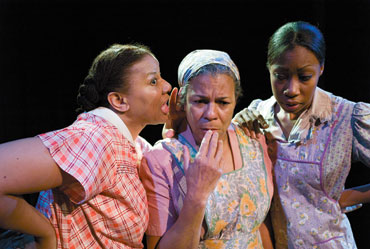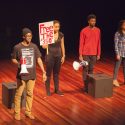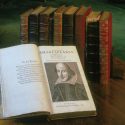University Theatre presents ‘The Bluest Eye’
"The Bluest Eye," Toni Morrison’s Pulitzer Prize-winning novel, is full of such poignant and elegant prose, it seems a natural choice for a stage adaptation.

Sheri Williams Pannell, Sandra Adell and Ashley Jeffrey in University Theatre’s production of Toni Morrison’s “The Bluest Eye,” adapted by Lydia Diamond.
Yet without the skill and careful editing made by Chicago playwright Lydia Diamond, the play would not be what it is today — a beautiful, tragic story of childhood innocence lost, a stage-worthy drama with Morrison’s unique prose intact.
"It is such an important novel to so many people, and because of that I felt a certain amount of pressure," says Diamond, who was commissioned to adapt "The Bluest Eye" for Steppenwolf Theatre’s Arts Exchange (now Steppenwolf for Young Adults).
Since the 2005 premiere, the play has enjoyed critical acclaim and box office success around the country. A production co-produced by Long Wharf Theatre and Hartford Stage opened in Connecticut this month. The University of Wisconsin–Madison University Theatre‘s production opens on Friday, Feb. 29.
For Diamond, it was essential to be faithful to the source material in the stage edition of "The Bluest Eye," even to adapting her own writing style to Morrison’s so the piece would flow.
"I had read it when I was really too young. I didn’t allow myself to open up to it — I didn’t let myself feel it and understand it," Diamond says. "When I read it again with an eye toward adapting it, I was blown over by it, just in awe of the beauty that is Toni Morrison’s writing."
Diamond says she focused on presenting a unified story, eliminating some extraneous characters and refining the dialogue.
"The greatest sacrifices for me were the whole characters and plots that had to be left out to serve the story of the crumbling of this community under the big umbrella of the atrocities of racism in our country," Diamond says. "This is, in a very specific way, the tragedy that befalls Pecola."
Diamond, an accomplished playwright in her own right, will visit campus Saturday, March 1, through a grant from the UW–Madison Arts Institute. She will speak to several classes that focus on playwriting and dramaturgy in the theatre and drama and English departments.
University Theatre Director Tony Simotes says choosing "The Bluest Eye" stemmed from the desire to "do something that carried some weight," in contrast to Tom Stoppard’s farcical "On the Razzle" presented during fall semester.
"There is an energy in the writing that is very much like Lorraine Hansberry’s," Simotes says. (This production is a part of the Lorraine Hansberry Project.) "It’s addressing the question, ‘What is our voice in this century, the American voice?’"
Simotes invited Derrick Sanders, artistic director and co-founder of the critically acclaimed Congo Square Theatre in Chicago, to direct "The Bluest Eye." Sanders is known for his work with August Wilson’s plays and recently returned from a production of "King Hedley II" at the Signature Theatre Co. in New York.
In 2006, Congo Square presented Diamond’s play "Stick Fly," a contemporary tale about a quarrelsome African American family at Martha’s Vineyard.
"I love working with Lydia," Sanders says. "I think she’s just a wonderful writer and great for this project."
Though the production was originally designed for young people, both director and playwright agree its themes are universally relevant. The topics of society’s definition of beauty, our internalization of that and its destructive ability can apply to all ages and cultures.
"Young adults are as sophisticated as adults or more so … these plays are not written for but presented to a young audience," Diamond says. "[This is] why I think the play has gone on to enjoy successful runs in venues that were not strictly for young audiences. It’s exciting, the life this play has gotten."
"The Bluest Eye" will run Friday, Feb. 29-Saturday, March 15, at Mitchell Theatre in Vilas Hall, 821 University Ave. Evening performances begin at 7:30 p.m., and matinees begin at 2 p.m. Individual tickets for all productions are $20 general public or $14 for UW–Madison students.


